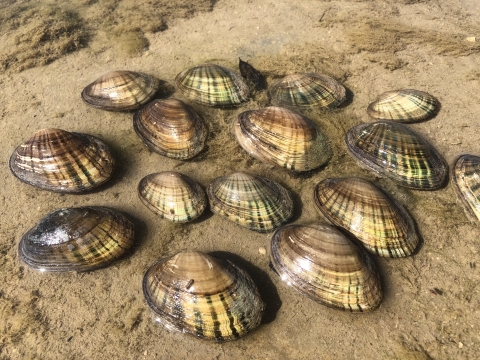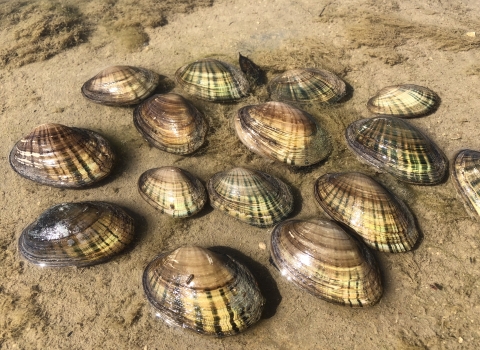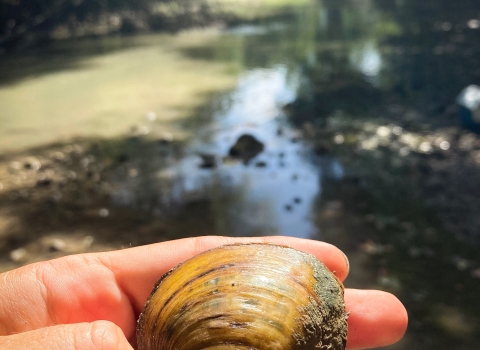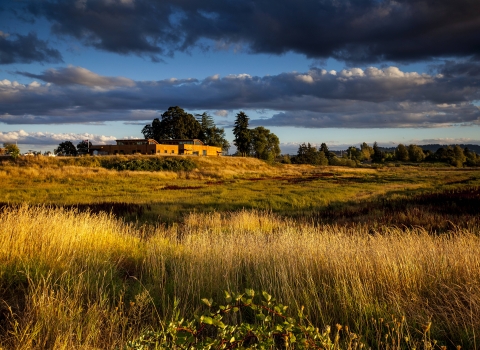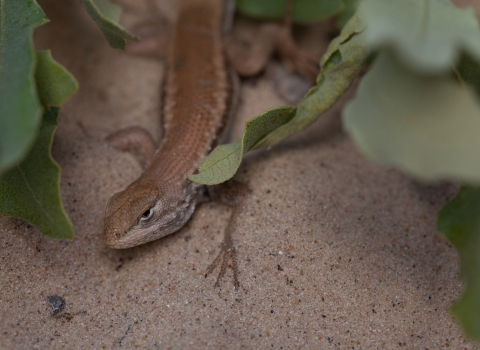The U.S. Fish and Wildlife Service has approved a 20-year agreement with the Lower Colorado River Authority (LCRA) and LCRA Transmission Services Corporation (LCRA TSC) to conserve four freshwater mussel species in the lower Colorado River basin of Texas.
In return for implementing voluntary conservation measures for the Texas pimpleback, Texas fawnsfoot, Texas fatmucket, and Balcones spike, the Candidate Conservation Agreement with Assurances (CCAA) provides LCRA and LCRA TSC assurance that they can continue to operate and maintain important utility infrastructure that provides water and power within the lower Colorado River basin should these species receive an Endangered Species Act listing.
“We are committed to using flexibility under the Endangered Species Act to create innovative and customized conservation solutions that benefit both landowners and wildlife,” said Jeff Fleming, the Service’s Acting Southwest Regional Director. “This CCAA is a win-win solution that provides LCRA/LCRA TSC the flexibility to manage their resources while also helping to ensure the long-term survival of these important species.”
CCAAs are intended to reduce or remove identified threats to a species. A number of factors threaten freshwater mussels across the country, includingdeclines in water quality, loss of stream flow, riparian riparian
Definition of riparian habitat or riparian areas.
Learn more about riparian and instream habitat fragmentation, and degradation of instream habitats. Urbanization and changes in climate patterns exacerbate these effects.
“This agreement illustrates LCRA’s longstanding commitment to responsible management of the lower Colorado River and its diverse ecosystems as we continue to provide water and power to the growing population,” said John Hofmann, LCRA executive vice president of Water. “We appreciate the Service’s collaboration with us on this CCAA.”
Conservation measures outlined for the mussels in the agreement include addressing water quantity, water quality, and invasive species invasive species
An invasive species is any plant or animal that has spread or been introduced into a new area where they are, or could, cause harm to the environment, economy, or human, animal, or plant health. Their unwelcome presence can destroy ecosystems and cost millions of dollars.
Learn more about invasive species , as well as freshwater mussel enhancement and protection and land conservation. In exchange for implementing these voluntary conservation actions, an associated Enhancement of Survival Permit issued with the CCAA authorizes a specific level of incidental take of the species and provides assurances that the Service will not require additional conservation measures without consent.
Mussels and other aquatic species play a vital role in the health of rivers and lakes. Improving the water quality and quantity of rivers and streams benefits both freshwater mussels and the human communities and businesses that rely on these water sources.
The species covered under the agreement include the Texas pimpleback and Texas fatmucket, which are proposed for listing as endangered under the ESA; the Texas fawnsfoot, which is proposed for listing as threatened; and the Balcones spike, which is currently under review for listing.
- The Texas fawnsfoot occurs in the San Saba River and in the Colorado River.
- The Texas pimpleback occurs in portions of the Colorado River basin, including the Colorado, Concho, Llano, and San Saba rivers, as well as Elm and Bluff creeks.
- The Texas fatmucket occurs in portions of the Colorado River basin, including the San Saba, Llano, North Llano, South Llano, James, and Pedernales rivers as well as Bluff, Cherokee, Elm, Threadgill, Live Oak, Onion, and Rocky creeks.
- The Balcones spike,recently discovered to be a unique species and split off from the false spike, occurs in the Colorado and Brazos river basins.Currently, the Balcones spike occurs in two populations in the Colorado River basin, in the lower San Saba and Llano rivers.
In addition to the recently signed agreement with LCRA and LCRA TSC, the Service has finalized or is currently working on developing conservation agreements and plans with several other river authorities to benefit at-risk and imperiled mussel species in Texas, including the Brazos River Authority, Trinity River Authority, Sabine River Authority and Guadalupe-Blanco River Authority.
“Working with river authorities to conserve freshwater mussels is essential because they have a deep understanding of their watersheds and the species that live there,” Fleming said. "We rely on the expertise, resources, and commitment of these partners to help us conserve and manage the habitats that these species need to survive and thrive."
This year marks the golden anniversary of the Endangered Species Act, which has delivered some truly remarkable successes over the past 50 years. The Service’s priority is to make implementation of the ESA less complex, less contentious and more effective by seeking accelerated recovery of threatened and endangered species across the nation and making it easier for people to coexist with these species.
Across the Southwest, 58 fish, wildlife and plant species have avoided ESA listing thanks to the collaborative efforts of federal agencies, states, Tribes and private landowners, with the ESA serving as a catalyst for conservation efforts that help protect at-risk species and their habitat.
To view the finalized CCAA and associated enhancement of survival permit, visit: https://www.fws.gov/library/collections/lower-colorado-river-authority-candidate-conservation-agreement-assurances.

